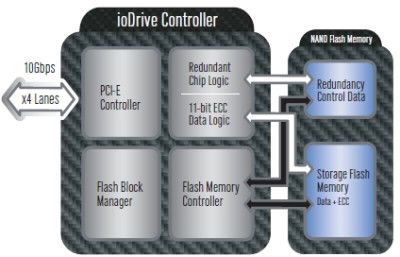- Qualcomm Launches Snapdragon 4 Gen 2 Mobile Platform
- AMD Launches Ryzen PRO 7000 Series Mobile & Desktop Platform
- Intel Launches Sleek Single-Slot Arc Pro A60 Workstation Graphics Card
- NVIDIA Announces Latest Ada Lovelace Additions: GeForce RTX 4060 Ti & RTX 4060
- Maxon Redshift With AMD Radeon GPU Rendering Support Now Available
Fusion-io’s Ultra-Fast PCI-E Solid-State Disk Tested
This past October, I linked to a story about a brand-new SSD that didn’t only raise the bar where performance was concerned, but dropped some jaws along the way. The company is Fusion-io, and their product is an SSD that bypasses the S-ATA bus entirely, and instead utilizes the available PCI-Express bandwidth. So, on its PCI-E 4x card sits either 80GB, 160GB or 320GB worth of SLC chips, and speeds that are truly mind-blowing.
The least-expensive version of the product is the 80GB model, which puts it on par in density with Intel’s impressive X25-M. However, Intel wins in price, as the Fusion-io card will retail for $2,995. No, that’s not a joke. The 320GB version is even more humorous, at a staggering $14,400. As for performance, the drives offer speeds of 700 MB/s Read and 550 MB/s Write, compared to Intel’s X25-M speeds of 250 MB/s Read and 70 MB/s Write.
In the tests conducted, the Fusion-io card cleaned house, although it was beat in a few tests by a RAID 6 configuration of eight Seagate 15K RPM drives, although while at 450GB, it costs close to $8,000. In HD Tune, however, the PCI-E SSD didn’t manage to hit its claims, with an average of 469.6 MB/s Read and 353.2 MB/s Write, which might be a sign that the CPU is becoming a bottleneck… something that is completely opposite to how things are with typical hard drives. Still, despite its missed claims, it’s going to be cool when we see more affordable versions of these in the future. It’s bound to happen with performance like this.

When it comes to servers, size matters; 1.75 inches at a time. 1.75 inches is how tall a single Rack Unit (U) server is. I have seen 1U servers capable of holding four full size hard drives, but to hold eight you need to flip the drives around on end. In most cases, to fit eight drives you will need a 4U server. If a company rents rack space in a data center then going from 1U to 4U is a big deal since you are renting space by the unit.




